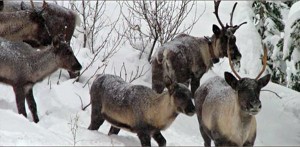Home »

Draft agreement on mountain caribou recovery
The governments of Canada and British Columbia stated in a joint press release today they are committed to protecting Canada’s wildlife by following the advice of scientists, acting to protect biodiversity and helping threatened or endangered species.
The continuing decline of caribou in Canada and the impact this has on biodiversity and on Indigenous peoples, in particular, is of concern, stated the Ministry of Environment and Climate Change Strategy and Environment and Climate Change Canada.
 The governments of Canada and British Columbia have developed a draft conservation agreement, under the federal Species at Risk Act, to support southern mountain caribou recovery, starting with the population known as the Central Group. The agreement sets out short, medium and long-term targets and immediate caribou recovery measures in the Central Group and it aims to reverse the population decline.
The governments of Canada and British Columbia have developed a draft conservation agreement, under the federal Species at Risk Act, to support southern mountain caribou recovery, starting with the population known as the Central Group. The agreement sets out short, medium and long-term targets and immediate caribou recovery measures in the Central Group and it aims to reverse the population decline.
British Columbia has committed to recovering southern mountain caribou by establishing population objectives and improving its overall legislative framework for species at risk. Recovery actions include range planning, habitat protection and restoration, as well as population management, including maternity penning and access control to sensitive caribou habitat. British Columbia will also lead in establishing a restoration fund under the agreement to support recovery actions for southern mountain caribou.
Canada and British Columbia are also discussing partnership opportunities with directly affected First Nations in the recovery of caribou. Following consultations with Indigenous communities and stakeholders, Canada and British Columbia are expecting to conclude their negotiations on the draft agreement over the next several months and release a final agreement in the spring of 2018.
The draft agreement articulates the commitments that will put southern mountain caribou on a positive trajectory. It acknowledges that the long-term goal is to achieve self-sustaining populations in the Central Group, consistent with the outcomes set out in the southern mountain caribou recovery strategy. Once the final agreement is in place, the intention is to expand the agreement to other southern mountain caribou groups in British Columbia.
“We are committed to working with British Columbia, Indigenous peoples, as well as with stakeholders, to develop science-based approaches to recovering caribou, while continuing to support economic development and job creation,” stated Catherine McKenna, Minister of Environment and Climate Change Canada.
“Along with our Indigenous and federal partners, we will work closely with industry and other stakeholders to effectively reverse the decline in caribou and restore people’s faith that responsible, sustainable resource development can occur in B.C.,” added George Heyman, B.C. Minister of Environment and Climate Change Strategy.
The draft agreement will be posted for a 30-day comment period on the Species at Risk Public Registry website on Nov. 27.
Species at Risk Public Registry
e-KNOW







